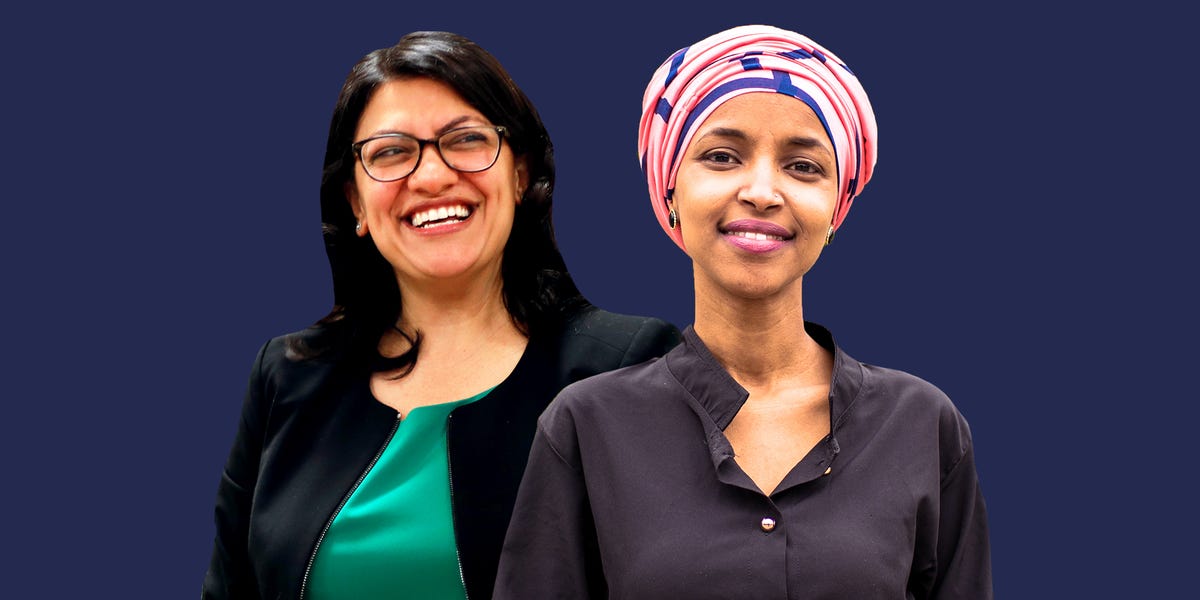

Earlier this year I read an article about the Salam Sisters, hijab-wearing dolls that come in many of the skintones of the Muslim diaspora, and immediately ordered one for my 7-year-old cousin. Yasmina, a brown-faced beauty wearing a purple removable hijab, arrived at our door. Tucked inside the box was also a sturdy brush for her long, black hair, visible when she chooses to not wear her hijab. It’s the doll I wish I had as a kid growing up in New York City in the ‘80s and ‘90s as the proud child of Muslim immigrants, with few Muslim figures in American culture or politics to see myself in. Now my cousin has the Salam Sisters, and we both have Rashida Tlaib and Ilhan Omar.
Advertisement – Continue Reading Below
Last night, these Muslim American women became the first to ever be elected to Congress. 42-year-old Palestinian-American Democrat Tlaib won her uncontested race in Michigan, and 36-year-old Somalian-American Democrat Omar won in Minnesota, beating out Republican Jennifer Zielinski.
The Muslim civil rights group Emgage estimates that as many as 100 Muslims filed to run for elected office this year. But these victories come at the same time as the Council on American-Islamic Relations reports a 17 percent increase in bias-motivated incidents and a 15 percent increase in hate crimes against American Muslims since Trump took office. It is a confusing time to be a Muslim woman in America.
My mother, an American citizen for 30 years, has suffered harassment in the neighborhood she’s lived in for decades, a neighborhood situated in one of the most tolerant and diverse parts of the country—Queens, New York. Having adopted the hijab later in life, we’ve seen firsthand the outright discrimination she faced after she began wearing her faith on her body. So to see Omar in her hijab in Congress feels like a mirage: her historic win is a chance to build a truly more inclusive America at a time when the nation is ripe with anti-Muslim sentiment. A study by the legal research and advocacy group, Muslim Advocates, shows that 80 races nationwide have used blatantly anti-Muslim rhetoric since 2016.
Advertisement – Continue Reading Below
Tlaib and Omar are the women I needed 30 years ago, when I was searching for my own Muslim American role models. Until now, I have spent the last three decades trying to find myself in the American women that have the most visibility: white women, who look nothing like me, face different challenges, and actively vote against my basic rights. According to a report from the Reflective Democracy Campaign, there was a 75 percent increase in women of color among nominees for Congress between 2012 and 2018. Still, women of color are about 20 percent of the U.S. population, but were only 7 percent of the nominees for Congress in 2018.
For many Muslim American women, Omar and Tlaib will be seen as nothing less than warriors; not only do they have to battle the patriarchy like their white counterparts, they also have to fight racism, xenophobia and Islamophobia. White women get to just be women, while women of color have to be black, Muslim, Asian, Native American, etc. before we can be women. Omar and Tlaib have already had a taste of this unfairness: as candidates, both of them were subject to vicious attacks online and at campaign events. The story of the victorious Muslim women may be a feel-good headline grabber, but our relatively short history in America has shown that besides the social media popularity and economic gains Muslim female bodies generate in industries like fashion, actual reforms are slow to come by, and the minds of white America are exceptionally resistant.
But we fight on, crafting our own stories. We are one of the most racially and ethnically diverse faith groups in the country. Our relationships with Islam and our racial backgrounds are all different from one another, but we are each discovering what it means to be Muslim American women. Now little girls like my cousin have Omar and Tlaib to look to as they navigate this complicated terrain.
Tlaib tweeted to Omar back in August, “I can’t wait to walk onto the floor of United States Congress hand in hand with you. So incredibly proud of you.”
So are we.
Be the first to comment